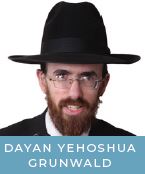Q&A From the Bais HaVaad Halacha Hotline
Sleeping Accommodations
Dayan Yehoshua Grunwald
July 29, 2020
 Q: I enjoy listening to relatively loud music. My neighbor claims that he goes to bed at 9:30 pm and the music disturbs his sleep. Recently, I made a sheva berachos in my home that ended at 11:30. He was very upset. I don’t believe that most people share my neighbor’s early sleep schedule. Does he have a valid claim against me, or is he burdening me with his personal difficulties?
Q: I enjoy listening to relatively loud music. My neighbor claims that he goes to bed at 9:30 pm and the music disturbs his sleep. Recently, I made a sheva berachos in my home that ended at 11:30. He was very upset. I don’t believe that most people share my neighbor’s early sleep schedule. Does he have a valid claim against me, or is he burdening me with his personal difficulties?
A: There is a section in Shulchan Aruch Choshen Mishpat that deals with nizkei shechainim (torts of neighbors). According to the Rama (C.M. 156:2), one may engage in noisy work like hammering nails even though it disturbs a neighbor’s sleep. (This is because one may generally live as he pleases in his own home, provided that any harm caused to neighbors is both tolerable and indirect.) If the neighbor is sick, however, one may not engage in noisy activity, because that is considered intolerable to a sick person. Nevertheless, the contemporary poskim explain that producing sleep-disturbing noises during normal sleeping hours is comparable to doing so during the day when a neighbor is sick (see Emek Hamishpat, Nizkei Shechainim 35:3). Thus, noisy music would only be a problem during normal sleeping hours or if your neighbor is sick. To the best of my knowledge, 9:30 PM is not generally considered a normal sleeping hour in most neighborhoods; 10:30 or 11 likely would be. If your neighborhood is that way, too, it would be permitted, unless the neighbor is sick.
Making a loud sheva berachos would be permitted even though it is done during normal sleeping hours and even if the neighbor were sick. The reason is that the occasional late sheva berachos is part of the normal use of a home and not something a neighbor has the right to object to, just as one is permitted to have small children at home though they often cry loudly at night.
Notwithstanding all of the above, if you can find a way to please your neighbor it would be very praiseworthy (see Mishkan Shalom, Nizkei Shechainim 10).